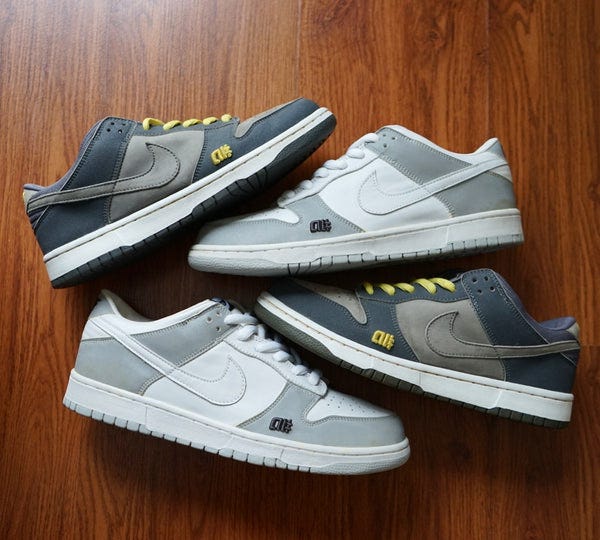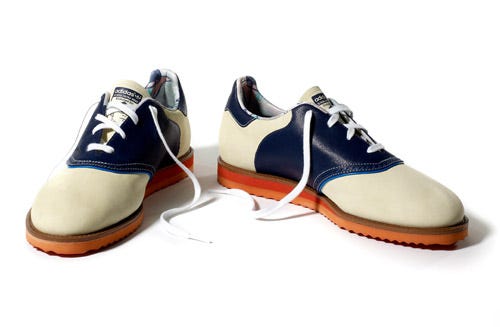The Earliest Adopter
The living source code of modern street culture.
The realest heads aren’t always the ones whose clout can be measured in social media metrics. And sure, while follower count, blue checks, and internet omnipresence are some of the hallmarks of modern day “influencers,” they’re an inaccurate gauge of whether someone is actually influential.
In the formerly niche worlds of sneaker and streetwear culture, the coolest thing wasn’t about popularity and recognition, but the ability to fly under the radar while being a low-key legend. Perhaps no one exemplifies that ideal more than Alyasha Owerka-Moore, whose work speaks for itself much louder than your average clout chaser on the feed.
Bobby Hundreds dedicates a whole chapter in his book on Owerka-Moore for good reason: He’s been one of the biggest influences on his career. The behind-the-scenes operator has worked with just about everyone, from Virgil Abloh, Russell Simmons, Atiba Jefferson, and even his pro skateboarder cousin Kareem Campbell.
Matter of fact, Owerka-Moore was the designer mind tapped by Russell Simmons to launch his Phat Farm label in the ‘90s, predating the rise of so-called “urban wear” brands like Daymond John’s FUBU, Eckō Unltd., and other aspiring mogul brands like Method Man’s Johnny Blaze. Owerka-Moore is also one of the first heads to really bridge the gap between hip-hop, skateboarding, and the fomenting streetwear movement in the form of a label. Ever entrepreneurial, Owerka-Moore was one of the first people to work on Damon Way and Ken Block’s Droors Clothing, which eventually became the skate shoe monolith DC Shoes. But one of his best-remembered labels is Alphanumeric.
“It was everything I’d seen and had wanted to do. Most of the people I knew at the time came out of skateboarding, snowboarded, might have surfed, might have been into cars, were into selvedge denim, into music,” says Owerka-Moore of the brand to Bobby Hundreds. “I just kind of wanted to create a lifestyle brand. So I guess Alpha could’ve technically been a streetwear brand or an action sports brand and/or a youth lifestyle brand all in one.”
Alphanumeric blended streetwear graphic flips with techwear innovative materials like GORE-TEX (also nodding to graffiti writers’ particular affinity for brands like Arc’teryx), but also took many of its design cues from military gear and Ralph Lauren alike. But perhaps its most significant contribution to sneaker culture was pretty much making the prototype for the Dunk SB.
The ‘80s basketball silhouette was brought back in 1999 in a yellow-and-black Wu-Tang version by Nike’s Drew Greer and Oli “POWER” Grant, the manager of the hip-hop supergroup. It was Owerka-Moore who suggested that that nascent Nike SB label make the Dunk its go-to skate shoe. Released in January 2001, the Alphanumeric Dunk Low Pro B set the stage for the SB craze that would characterize early-2000s sneaker culture.
“I will take full credit for that, and fuck anyone who says anything otherwise,” says Owerka-Moore of this part of his legacy, adding: “Except for Drew Greer because he’s the one that put it together.”
Since Alphanumeric, Owerka-Moore has gone on to launch several of his own labels influenced by his evolving interests. There was the premium Japanese denim line Fiberops, which was screenprinting graphics across the front crotch of jeans (inspired by old showroom jeans from brands like Lee and Wrangler) before BAPE and BBC made it a thing with the ubiquitous Running Dog graphic. He also did a stint as the resident brand historian at canvas sneaker label PF Flyers, before launching a rockabilly and punk-influenced denim line called The Teen-Aged.
What Owerka-Moore represents is a visionary whose prescience is also a burden. Timing something to the mainstream zeitgeist is something brands like Aime Leon Dore and Kith have done exceptionally well, with the latter being especially known for self-promotion. For creatives of a more demure demeanor like Owerka-Moore, the current paradigm certainly isn’t suited for “letting the work speak.”
“As I’ve gotten older I think I’m probably better at trend forecasting then I am as a designer. The thing I’m not good at is capitalizing on that. I can always see where the holes are in the marketplace and where to make money,” reflects Owerka-Moore to The Hundreds. “I’ve helped an innumerable amount of people make money filling those holes, those voids, but just not myself. And usually it’s because I get so excited about working on the project and making it come to fruition as opposed to lining my own pockets.”
Indeed, with an impressive output that ranges from entire labels to collaborations with adidas Originals, Owerka-Moore has put in decades’ worth of work and remains one of the most respected heads in the industry. The reverence for him and the myriad of people he’s touched in the community became even more evident when, in an uncharacteristic move, he shared that he was recently diagnosed with Stage 3 colon cancer and is in the midst of undergoing chemotherapy to combat the disease.
There is a GoFundMe gathering donations to help him fight during the long road ahead, and so many members of the streetwear and sneaker community and beyond have come out of the woodwork to help him out. As the organizers of the fund say: “Alyasha has spent most of his life taking care of everyone else. It’s our turn to take care of the guy who has inspired and directly influenced so many of ours.”







Great read as always.
Great writing/read. Nothing but positivity to Owerka-Moore.